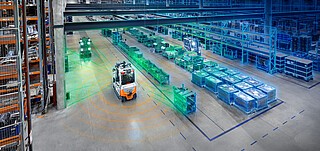
"If it cannot be scaled, it is not innovation."
Anyone who wants to make a real difference in logistics needs the courage to embrace change and the support of a strong team. Stefan Hohm, Chief Development Officer at Dachser, has been recognised as Logistics Leader of the Year 2025. In this interview, he discusses innovation, mindset and the future of the industry.
The Logistics Leader of the Year award honours individuals who have made a significant contribution to the logistics industry. Stefan Hohm and his team at Dachser share a similar approach to that of the developers at STILL: They firmly embed innovation within the company, combining research with practical application to develop effective solutions. Both companies therefore reinforce the importance of actively promoting innovation in logistics. A good example from Dachser is the @ILO project, which is discussed in more detail in the interview. At STILL, this commitment to innovation is evident in research-based projects such as ARIBIC (Artificial Intelligence-Based Indoor Cartography), which enables the creation of a digital twin of all warehouse activities.
From 5G campus networks and autonomous driving to live parcel tracking, both STILL and Dachser demonstrate that real change happens when everyone works together. In this interview, Stefan Hohm explains how this collaborative approach works in practice and why innovation can only succeed as a joint effort.
![Interview with Stefan Hohm, Chief Development Officer at Dachser. [Copyright: DACHSER SE]](/fileadmin/_processed_/e/6/csm_4X8A9506_be_c429df2fce.jpg)
Mr Hohm, what does innovation mean to you?
To me, innovation is never the work of a single individual. In a company like Dachser, new ideas can only truly emerge if innovation is embedded as a shared objective across the executive board and throughout the entire organisation. It is only through this collective attitude and mindset that the necessary support is created to develop ideas into genuine innovations and multiply them across the network. It's about working together to bring about change.
How can you tell whether an innovation is genuinely relevant?
For us, it is crucial that an innovation works not only on a small scale, but also has an impact across the entire network. We don't just develop prototypes for show; we develop solutions that deliver real benefits in all areas. Innovation is valuable when it noticeably improves processes, speeds them up and makes them more customer-focused. This is why we believe that anything that cannot be scaled up is not an innovation for Dachser.
![Stefan Hohm and his team at Dachser are developing innovative solutions for the logistics industry. Hohm has now been honoured as Logistics Leader of the Year in recognition of his efforts. [Copyright: DACHSER SE]](/fileadmin/_processed_/1/6/csm_IMG_0285_ff7608f1f6.jpg)
How do you decide which ideas will be implemented and which might not?
In the past, ideas were often collected individually and tried to be implemented directly, which was rarely successful. Today, we rely on teamwork and structured processes. We bring together people with different skills in a targeted way to create spaces where ideas can flourish.
One example is our strategic programme, 'Idea2Net', which fosters innovation within the network. A large team collects ideas developed by the branches and works together to further develop them. This creates a structured innovation process, covering everything from mindset and participation opportunities to prototypes and pilots. Our Idea2Net community meetings and the Dachser Enterprise Lab's 'Result Days' are also attended by our executive board colleagues. Together, we provide the necessary resources, such as time, money and external expertise. It is crucial that everyone involved is included, from the idea generators to the executive board. During the rollout, we involve the original idea generators so they can see how their ideas have become real innovations.
What role does research play in your company?
Our approach is centred on the close interlinking of science and business. At the Dachser Enterprise Lab, our teams collaborate with scientists to develop innovations that deliver tangible benefits. Until recently, it was said that conducting research in logistics was impossible because customers set the pace. This has changed dramatically. Now, customers demand innovative solutions to help them. Our collaboration between research and practice enables us to develop new technologies and apply them within the company.
Which technology was one of those successful ones?
A good example is the @ILO project. The aim was to enable the location of packages in the transshipment warehouse at any time. Thousands of pallets are loaded at our branches every day, and occasionally a pallet is not where you expect it to be. We knew that having permanent, real-time visualisation of the packages in the transshipment warehouse would significantly improve quality. To achieve this, we searched for the right technology to solve the problem. After four months, we decided to use camera technology and data matrix codes for this purpose. This enables us to determine the exact dimensions of the packages in the warehouse from above. This has enormous potential for us because it enables us to control the loading of swap bodies. With only one additional pallet on each swap body, for example, we can load an extra 8,000 pallets every day. Now, warehouse employees can see where a pallet is and what it looks like at the touch of a button on a tablet.

How do you strike a balance between vision and implementation?
Of course, some of our ideas may sound utopian at first. It is important to constantly compare them with practical reality. Which technology actually solves a problem? How can its benefits be demonstrated in everyday life? We focus on approaching visions pragmatically and implementing innovations in a way that makes them work in practice.
In your opinion, how important is artificial intelligence for the future of logistics?
AI will bring about significant changes to logistics in the coming years. It will help us to automate processes, provide a better basis for decision-making, and take on simple, repetitive tasks that nobody likes to do. We have already launched projects that will significantly improve the efficiency of our customer service, freeing up more time for us to provide personalised customer care and solve problems. I don't see this as a threat to jobs; quite the opposite, in fact. AI will provide our teams with excellent support. Logistics is complex and often involves many details. I think more and more tasks will be automated in future, but it will take a very long time before robots take over completely. Humans will continue to make intelligent decisions and use their creativity to find solutions that go beyond that, and that's a good thing.
If you could give advice to someone who wants to advance logistics through innovation in the same way that you do, what would it be?
My advice is to keep moving — in many ways. Those who always stay in the same place, both in their minds and in reality, will struggle. You have to step out of your comfort zone, embrace new roles and dare to immerse yourself in different worlds. A large part of my journey has involved leading people in ever-changing contexts. We need to make our professions attractive beyond the boundaries of traditional logistics – this is the only way to attract and retain skilled workers.
Stefan Hohm and his team at Dachser show how innovation in logistics can succeed through courage, teamwork and a willingness to embrace change. The Logistics Leader of the Year award honours pioneers like these, who provide important impetus for the industry. Further information about the award can be found on our website.
Contact request
Subscribe to the Newsletter !
Always up to date with STILL: Subscribe to the STILL newsletter and we will inform you regularly about interesting industry topics.
